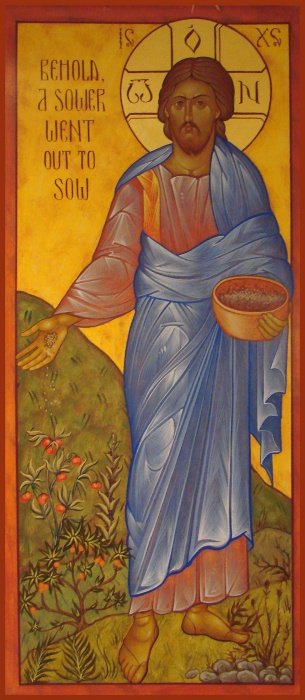The parable of the Sower appears in all three of the Synoptic Gospels. This fact suggests that it may truly have been one of the parables actually said by Jesus, Some scholars suggest that a better name for this parable would be the parable of the different sowings.
 Think about the context of the parable. The sower walks over a field, fallow since the harvest, covered with thorns and crossed by a footpath made by trespassers. It is ready for seeding, having been softened by the first rains. It is important to note that in Palestine ploughing comes after sowing. This then explains why the seed falls where it does. Once sown, the seed is ploughed under and all else with it – the thorns and the footpath as well. What is essential is the ploughing of the soil so that the seed has a good, rich environment in which to grow.
Think about the context of the parable. The sower walks over a field, fallow since the harvest, covered with thorns and crossed by a footpath made by trespassers. It is ready for seeding, having been softened by the first rains. It is important to note that in Palestine ploughing comes after sowing. This then explains why the seed falls where it does. Once sown, the seed is ploughed under and all else with it – the thorns and the footpath as well. What is essential is the ploughing of the soil so that the seed has a good, rich environment in which to grow.
There are various interpretations for this parable. One possible interpretation, which I believe has a greater meaning for us, focuses on the hearer’s reception of the teaching of the Lord. It is one thing to hear the teachings of Jesus and another to allow the teachings of Jesus to take root in your heart and grow. This interpretation of the parable challenges us, the hearers, to open our hearts and minds to the Lord’s teachings and allow His way of living to take root in our lives. This, of course, requires work on our part. We must soften our hearts and minds by ploughing under those things in our lives that keep us from fully and completely hearing the teachings of Jesus and then truly incorporating Jesus’ ways of looking at and thinking about life into our lives.
For example, too often we hear the words love your enemies and, while we acknowledge that these are words are truly the words of Jesus, we find a million reasons why living in a manner which expresses love for our enemies is totally impossible and/or unrealistic. We humans easily make excuses for our prejudices. While we know the rules of living that Jesus gave us, we are very prone to make excuses why we judge others, refuse to forgive others and consider others less than ourselves. There are no excuses, truthfully, why we should hate others and condemn others, even those who hate us and are attempting to hurt us.
I know that this is contrary to the way our modern society thinks. I know that the fear that is presently quite prevalent in our modern world militates against an easy acceptance of this essential teaching of Jesus. Nevertheless, the followers of Jesus are called to truly love those who hate. I also know that the only way that we can change our thinking is, perhaps, through prayer and fasting. I know that our modern world can be very scary. I know that our modern world is filled with hatred, selfishness and greed. I also know that God has called us to live like Jesus did!
